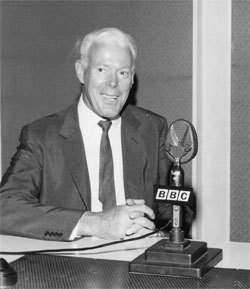Broadcasts 7 May 1984
Trevor Leggett was head of the Japanese Department of the BBC.

This is one of his broadcasts to Japan
Zubari for 7 May 1984
Hello listeners!
We have an English saying that the happiest things in life often come as a complete surprise, unplanned and unexpected. Well, certainly this decoration was a great surprise to me, like something coming down from above the clouds.
The Ambassador said, when he conferred the insignia, that it was, “In recognition of your distinguished contribution to Anglo-Japanese understanding through your broadcasts to Japan, and your achievement in introducing Japanese culture to the United Kingdom.”
I was for 24 years Head of the Japanese Service of the BBC, and after retiring in 1970 have continued these programmes as a guest speaker. We have had many listeners’ letters – some years we have topped a hundred + 40 thousand but, still, it is very moving to have this official recognition that these broadcasts have contributed to mutual understanding.
I think ‘understanding’ is a very important word. We do not want fanatical admirers, but friends who know our faults but still like us; surely this applies between countries as well as between individuals.
We have adopted this policy in our BBC broadcasts. When first commentator-announcers were seconded to us from NHK and later from other networks, when they made their personal broadcasts about things and people which they had been to see, they tended to make the broadcasts always very favourable, without mentioning faults. I told them to include comments on the unsuccessful things as well, but, at first, they were reluctant to do this. Perhaps they thought I did not really mean it. But, gradually, they realized that this was indeed what the BBC wanted, and then their talks became much more interesting.
I believe this sort of frank broadcast, does contribute to real understanding. When listeners realize that we have successes but also failures for which we are still seeking a solution, they feel a sort of friendliness and intimacy with Britain. ‘Why,’ they think, ‘this is just like Japan. We too have some successes, and some failures.’
The fact that some of their scripts have been published as books in Japan, as have some of my own Zubari Hodan scripts, and that these have often been very successful, shows that they do indeed have a value.
But boasting broadcasts, which conceal all faults and failures, do not have a value; they are attempts to deceive, which get found out in the end. They create suspicion and contribute only to mis-understanding.
But to take to Japan British ideas, and news about Britain, was only a one-way street. It does not necessarily lead to mutual understanding. Immediately after the War, when the atmosphere was still full of the feelings of enmity, I did a good deal to spread Judo in Britain, and in Europe.
I was, for many years, the highest-graded Westerner, a Kodokan Sixth Dan, and I founded one 100-mat dojo in London and helped many others. I invited some of the best Japanese teachers to England to teach, and, later, was able to help a good many of the young British 2nd and 3rd Dans to go out to Japan to train further there. Nearly all of them learnt Japanese. In fact, one of them, John Newman, is now head of the Japanese Service and his voice is familiar to you all.
But Judo was not enough. I felt that I must do something in the literary field, and in 1947 I published my first translation of a classical Japanese text, in a small magazine. This was the short Taikunren of Takamori Saigo. I felt a great thrill when I saw this in print in English. Since then, I have published hundreds and hundreds of pages of translations from the Japanese, but that first little success was an occasion I shall never forget. I have seen extracts of it quoted, and I feel now that that was the first step.
When we first tie the Black Belt in Judo, on receiving our Shodan, it is the first real step, and also a great thrill. Some famous champions have confirmed my own feeling, that this first wearing of the Black Belt is the highest moment in Judo, higher even than getting sixth Dan ‘from above the clouds’
In the same way, as I received this decoration, and heard the Ambassador say, “not only for your broadcasts, but also your achievement in introducing Japanese culture to the United Kingdom,” I thought back to Saigo’s comment:
“The first step is half the journey.”
Well, the 29th was the Emperor’s official birthday, as is the Queen’s official birthday. No one else has two birthdays each year, but this year I felt that perhaps I, for once, had had an official birthday, and received ‘from above the clouds’ a wonderful birthday present.
© Trevor Leggett